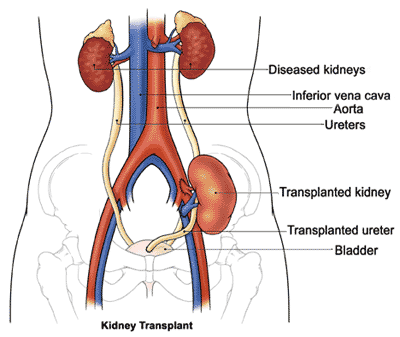Patients with chronic renal failure or end stage renal disease may be advised Kidney transplant as a treatment option. Without long-term dialysis or a kidney transplant, the disease would prove to be fatal.
Source of kidney (for transplantation) can be a living donor or a deceased (non-living/cadaver) donor. Living donors can be related or unrelated to the patient. Chances of match are better if the donor is a blood relative. Cadaver organ comes from brain dead people who have willed their kidneys before their death or is donated by their family members at the time of death.
All donors are carefully screened and matched so that the recipient has maximum chances of a successful transplant.
PROCEDURE
Retrieval of the donor organ from a live donor is done under general anaesthesia. Open nephrectomy involves incision through the side or front of the abdomen. The kidney and an attached portion of ureter are removed after cutting and clamping its blood vessels. The incision is then resutured.
This process can also be done through laparoscopic route which is minimally invasive and promotes faster recovery.
Similar procedure is followed for cadaver organ where both kidneys are removed at the same time.
The donor kidney is placed on ice and flushed with a cold preservative solution. The transplant is then done as early as possible.
The recipient, under general anaesthesia, is transplanted the new kidney which is placed on the lower side of the abdomen below the existing non-functional kidney. It is surgically connected to nearby blood vessels. The ureter of the new kidney is attached to the kidney recipient`s bladder.
The patient`s existing, diseased kidneys may or may not be removed.

DURATION
The transplant operation takes about three to four hours. Hospital stay of approximately 10 days would be needed.
RECOVERY
Some pain and discomfort in the area of surgery is commonly experienced, which is controlled by medication. There could be numbness, caused by severed nerves, near the incision.
Recipient is given immunosuppressants to prevent the body`s immune system from rejecting the new kidney. The transplanted kidney may start functioning immediately or may take few weeks to function normally.
The kidney donor faces no problems by donating one kidney, as the remaining kidney is sufficient for normal functioning.
RISKS
As with any other surgery, there is risk of bleeding, infection, etc.
The recipient is more prone to infections as the body immunity is suppressed, so due care has to be taken. There is risk of rejection of the new kidney as the body considers it to be a foreign object. It may occur soon after transplantation, or several months or years after the procedure has taken place.
The success of a kidney transplant depends on the quality of the match between donor and recipient and the skills of the surgeon.
Kidney transplant laws in India
According to the Indian Law, close relatives of recipient like parents, children, siblings, spouse can donate the organ. For non related donor, an approval has to be taken from the government authorization committee. No commercial transaction is permitted and we do not arrange donors. Some legal formalities are to be completed through the respective Embassy and details would be made available in case you plan to get the surgery done in India.